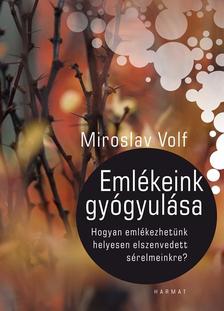Description
Emlékeink gyógyulása - HOGYAN EMLÉKEZHETÜNK HELYESEN ELSZENVEDETT SÉRELMEINKRE? by MIROSLAV VOLF - HUNGARIAN TRANSLATION OF The End of Memory: Remembering Rightly in a Violent World
PAPERBACK 2016
ISBN: 9789632882888 / 978-9632882888
ISBN-10: 9632882881
PAGES 256
PUBLISHER: HARMAT
About the Author:
Miroslav Volf (born September 25, 1956) is a Croatian Protestant theologian and public intellectual who has been described as "one of the most celebrated theologians of our day". Volf currently serves as the Henry B. Wright Professor of Theology and Director of the Yale Center for Faith and Culture at Yale University. He previously taught at the Evangelical Theological Seminary in his native Osijek, Croatia (1979–80, 1983–90) and Fuller Theological Seminary in Pasadena, California (1990–1998).
Hungarian Summary:
Korunkban általánosan elfogadott nézet, hogy a múlt szörnyűségeit – népirtásokat, terrortámadásokat, nyilvánvaló igazságtalanságokat – meg kell őriznünk emlékezetünkben. De vajon mit jelent helyesen emlékezni, és miként válhatnak emlékeink a gyógyulás forrásává az egyre erősödő fájdalom és gyűlölet helyett?
English Summary:
Can one forget atrocities? Should one forgive abusers? Ought we not hope for the final reconciliation of all the wronged and all wrongdoers alike, even if it means spending eternity with perpetrators of evil? We live in an age when it is generally accepted that past wrongs - genocides, terrorist attacks, bald personal injustices - should be constantly remembered. But Miroslav Volf here proposes the radical idea that letting go of such memories - after a certain point and under certain conditions - may actually be the appropriate course of action. While agreeing with the claim that to remember a wrongdoing is to struggle against it, Volf notes that there are too many ways to remember wrongly, perpetuating the evil committed rather than guarding against it. In this way, the just sword of memory often severs the very good it seeks to defend. He argues that remembering rightly has implications not only for the individual but also for the wrongdoer and for the larger community. Volf's personal stories of persecution offer a compelling backdrop for his search for theological resources to make memories a wellspring of healing rather than a source of deepening pain and animosity. Controversial, thoughtful, and incisively reasoned, The End of Memory begins a conversation hard to ignore.













